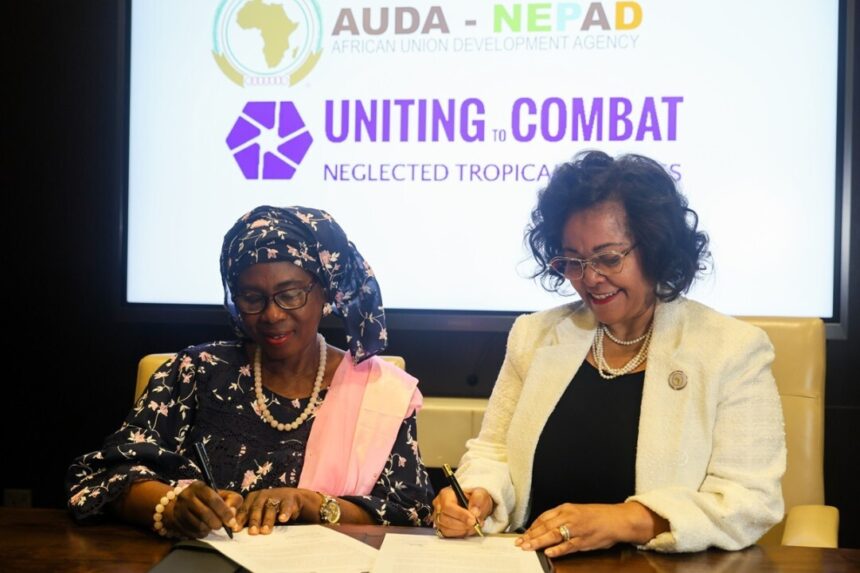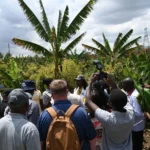By Christine Ochogo I christawine@gmail.com
The global report on neglected tropical diseases 2024 depicts encouraging advancements in the battle against these ailments.
However, it highlights key challenges, ranging from a slow post COVID-19 recovery to funding uncertainties, from geo-political disruptions to climate change, from gaps in knowledge and tools to insufficient data all which illustrate the complexities inherent in addressing the neglected tropical diseases.
Amidst this background, two entities recently announced a move to lighten the burden of these diseases in Africa.
The partnership, says a media release, is between AUDA-NEPAD and Uniting to Combat NTDs aims to jointly implement and mobilise resources to support AUDA-NEPAD’s neglected tropical diseases program.
But what is AUDA-NEPAD? The New Partnership for Africa’s Development (NEPAD) is a socio-economic flagship Programme of the African Union (AU). It is fondly referred to as AUDA-NEPAD. It’s four primary objectives are to eradicate poverty, promote sustainable growth and development, integrate Africa in the world economy and accelerate the empowerment of women.
The latter is a global advocacy organisation that exists to end neglected tropical diseases (NTDs) by mobilising resources in support of the World Health Organization’s NTD road map and the Sustainable Development Goals.
The partnership, seeks, among other things to leverage AUDA-NEPAD’s ongoing domestic health financing programme and efforts towards overall health systems strengthening to support AU Member States’ capacity to address and eliminate priority diseases, such as NTDs. Additionally, the partnership will undertake high-level advocacy to enhance political will to achieve these objectives.

NTDs are a group of twenty-one diseases and infections that can disable, disfigure, and be fatal. They disproportionately affect those living in low-income, hard-to-reach areas.
These diseases, which include conditions such as river blindness, trachoma, and lymphatic filariasis, perpetuate cycles of poverty and hinder economic growth and development.
Currently, more than 1.65 billion people worldwide are at risk of NTDs, with the burden in Africa accounting for more than 35%.
Twenty-one countries in the African continent have now eliminated at least one NTD, with several countries eliminating multiple NTDs, including Togo and Benin. However, to eliminate these diseases, increased resources, actions and political will are essential.
The agreement is expected to strengthen efforts and mobilise resources to eliminate NTDs across the African continent. This partnership, formalized during the 45th Ordinary Session of the Executive Council and the 6th Mid-Year Coordination Meeting of the African Union in Accra, represents a significant milestone in the fight against NTDs in the continent.
Signing this agreement on behalf of their respective organisations were Ms. Nardos Bekele-Thomas, the first female CEO of AUDA-NEPAD, and Dr. Isatou Touray, Executive Director of Uniting to Combat NTDs and former Vice President of The Gambia.
At the signing, Ms. Bekele-Thomas emphasized the importance of the partnership, stating, “To create the Africa we want, strong collaborations and value-adding partnerships will be key in addressing priority diseases such as NTDs. Eliminating these diseases is critical to future economic growth and sustainability on the continent and will create an incredible return on investment in a political environment where every dollar matters.”
This partnership exemplifies how African leadership is showing the world that NTDs can be defeated. The signatories of the agreement also underscore the importance of female leadership in driving development across Africa. Both Ms. Bekele-Thomas and Dr. Touray have devoted their careers to the continent’s progress, championing causes that improve health, social outcomes and economic opportunities for all.
Said Dr. Touray, “This strategic partnership marks a pivotal step in our collective efforts to end NTDs across the African continent. By mobilising resources and political will, we can achieve our goal of eliminating these diseases and improving the quality of life for millions of Africans,” adding that,
“The commitment and collaboration demonstrated today set the stage for a brighter tomorrow, where NTDs are a relic of the past and Africa’s potential is fully realized.”









